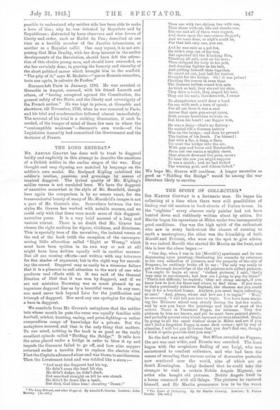THE LONG RETREAT.* Ma. ARNOLD GRAVES has done well to
trust to doggerel boldly and explicitly in this attempt to describe the emotions of a British soldier in the earlier stages of the war. Easy thought and easy rhyming are matched by language on the soldier's own model. Mr. Rudyard Kipling exhibited the soldier's routine, passions, and grousings by means of inspired doggerel. The lyrical quality of Mr. Kipling's soldier verses is not emulated here. We have the doggerel of narrative somewhat in the style of Mr. Masefield, though here again the comparison is by no means exact, for the transcendental beauty of many of Mr. Masefield'e images is not a part of Mr. Graves's aim. Somewhere between the two styles Mr. Graves has worked with notable success, and we could only wish that there were much more of this doggerel. narrative poem. It is a very brief account of a long and variotiS retreat. There is no doubt that Mr. Graves has chosen the right medium for 'vigour, vividness, and directness. This is specially true of the narrative ;, the isolated verses at the end of the book (with the exception of the uncompro- mising little allocution called "Right or Wrong," which must have been written in its own way or not at all) might have been written equally well in another manner. But all are rousing efforts—not written with any tolerance for fine shades of argument, but in the right way for recruit- ing the crowd. Doggerel may so easily be a tiresome failure that it is a pleasure to call attention to the work of one who produces real effects with it. It was said of the General Election of 1840 that it was won by doggerel, and if we are not mistaken Browning was as much pleased by an ingenious doggerel line as by a beautiful verse. In any case, one need never look beyond Lear for the justification and triumph of doggerel. Nor need any one apologize for singing a hero in doggerel.
We conclude from Mr. Graves's metaphors that the soldier into whose mouth .he puts the verse was equally familiar with football, cricket, hunting, racing, and prize-fighting—a rather compendious range of knowledge for a private. But the metaphors Succeed, and that is the only thing that matters. To our mind, nothing in the book is eb good as the really excellent episode called "Holding the Bridge." It tells how the mine placed under a bridge in order to blow it up and impede the Germans failed to go off, and how nine sappers returned under a terrible fire to replace the electric wire. First the Captain adianced alone and was blown to smithereens. Then the Lieutenant tried and was riddled like a sieve :— " And next the Sergeant had his try,
Ho didn't seem the least bit shy, He didn't dodge, he didn't duck, But marched straight on till he was struck.
He didn't lie down like a lamb,
But died, God bless hint ! shouting 'Damn !'
Murray. Lie. net.] Unwin. [Sa, net.]
Then one with two stripes, two with one, Then throe without, like red shanks run. But one and all of them were copped, And down upon the race-course dropped; And we were done, as nigh's could be, For that left only one, you see.
And he was onto as a pot fox, He didn't stop out of his box. But squatted till the Klucking Hen, Thinking all safe, sent on his men; Then stripped his body to his pelt, And drawing tighter in his belt, And pulling himself close together. lie raced all out, just hell for loather, Straight for the bridge. Oh ! it was prime Clocking the course in oven time.
Tho German bullets round him spin As thick as hail, they shaved his chin,
They drew a tooth, they singed his hair, They cut his nails, Gawdstrewth, I swear
No sharpshooter could draw a bead On one with such a turn of speed: For all our lives it was a race Across that open gun-swept space, Both armies breathless looking on. But bless his heart! our Sapper won.
Ho was a daisy—that's no flattery : Ho waited till a Gorman battery Was on the bridge ; and then he pressed The button of his bomb. I'm blessed I But with a fizz, a bang, a flare, Up went the bridge into the air, With gun and horse and Bombardier. From out our ranks a mighty cheer, That almost drowned the guns, arose= To hear the row you might suppose It was a match; and we had kicked The winning goal, and Albion licked."
We hope Mr. Graves will continue. A longer narrative as good as "Holding the Bridge" would be among the war literature likely to survive.


































 Previous page
Previous page